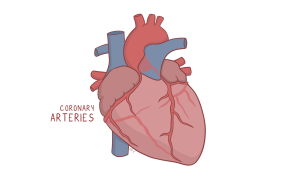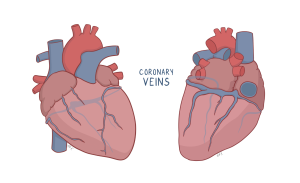60 Heart Vasculature
Why does the heart have its own vascular system?
Think of the arteries as highways, delivering vital oxygen-rich blood while veins are the return routes, bringing waste products in blood back to the right atrium. The blood then flows into the lungs for reoxygenation. While massive oil tankers provide fuel for thousands of cars everyday, it is common to overlook the fact that these tankers require fuel themselves to operate! Like all other tissues in the body, the heart also requires oxygen-rich blood to function. While arteries and veins transport oxygen-rich blood and remove cellular waste throughout the body, the coronary arteries and coronary veins ensure that the heart receives its own supply of oxygen-rich blood and removes waste.

Figure 117 Anterior view of the pleura
| Coronary arteries | Region Supplied |
| Right coronary artery | Small branches to right atrium |
| Right marginal artery | Right ventricle |
| Posterior interventricular artery | Right ventricle, left ventricle |
| Left coronary artery | Circumflex artery, LAD artery |
| Circumflex artery | Left atrium, left ventricle |
| Left anterior descending (LAD) interventricular artery | Left ventricle, right ventricle |
There are four venous entry points into the right atrium: superior vena cava, inferior vena cava, anterior cardiac vein, and coronary sinus. The coronary sinus drains most coronary veins, with the exception of the anterior cardiac vein which drains directly into the right atrium.

Figure 118 Anterior view of the coronary veins
| Coronary veins | Region supplied |
| Small cardiac vein | Right atrium, right ventricle |
| Anterior cardiac vein(s) | Right ventricle, drains into right atrium |
| Middle cardiac vein | Left ventricle, right ventricle |
| Great cardiac vein | Left atrium, left ventricle, right ventricle |
| Left posterior ventricular vein | Left ventricle |

